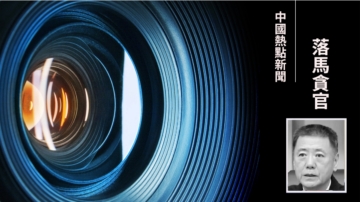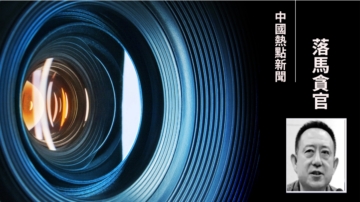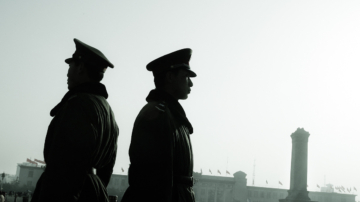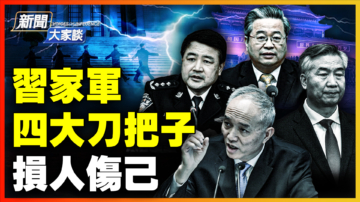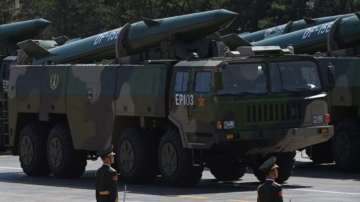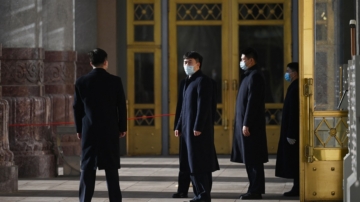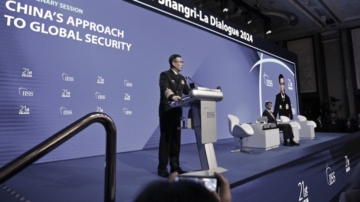【新唐人2013年02月21日讯】预定在3月举行的两会,标志着中共从18大开始的人事换届交接结束,国内外热衷于猜测新领导人习近平,将带领中国走上一条甚么路。官方媒体19号引述港媒的评论说,习李新政焕发正能量。媒体的期待和溢美之词,令人不由想起胡、温的当年。
香港《大公报》的文章总结了习近平、李克强近期在军事、外交、反腐和经济发展几方面的言论,认为他们在各领域都有新思路、新提法,新政焕发正能量。
对此,多位评论人士指出,习、李新上台后的举措,仍然没有从根本上解决中国的问题。
中国社会民主党中央委员会主持人刘因全:“习李最近的表现,还是在原来的体制之内做一些开明的动作,我认为,如果不改变这种体制,这些领导人只做一些开明的动作,不会解决根本问题。”
中国民主党全委会美国委员会主席张健:“习李新政有甚么呢?就是穿新鞋走老路、新瓶装旧酒,维护共产党体制去盘剥人民,维护寡头集团的利益,去把中共岌岌可危的统治他想苟延残喘。”
《大公报》文章认为,习近平显示了澄清吏治的决心,因此近期四川省委副书记李春城、中央编译局局长衣俊卿等省部级高官,和一大批厅局级官员因违纪落马。
对此,刘因全估计,习、李在两会后,可能还会在反腐方面采取一些动作,但能走多远?还有待观察。
刘因全:“估计两会以后,习、李会采取一些新的动作。但是因为中国积重难返,特别是江泽民这个班子造成了太大的负面作用,习、李上台以后还会受原来的既得利益集团的制约。他们释放出来的一些新思路,也会被这些利益集团大打折扣,慢慢给它消融掉。”
在经济方面,《大公报》认为,习、李在多个场合的讲话,体现出他们重视经济发展的品质和效益。评论指出,中共前几年为了拉动GDP而透支了环境成本和道德成本,再沿着之前的路已经走不通。
张健﹕“中国的经济体制改革,有人说它已经经过这么多年的飞跃,但是你看一看,我们的子孙要承担的后果到底是甚么?我们的后几代的子孙,要面临非常有毒的环境,可能人类的生存都已经不适宜了,这样的情况下,他还捧出一朵盛开的罂粟花,这难道不是最大的嘲讽吗?”
张健认为,要进行经济改革,势必也要进行政治改革。
张健:“对于中共来说,它想改革经济,经济体制改革一定与政治体制改革是双轨制,就像一个火车轨道一样,不能用一根轨道去开另一个火车,当中国政治体制改革走入死胡同以后,那么经济体制改革一定会遇到一个瓶颈。”
如今国内媒体对习李新政的溢美之词,无不令人联想到当年的胡温新政。胡、温刚执政时,同样被认为会给中国政坛带来清风。他们提出的“和谐社会”让海内外民主人士曾经一度有所期待。
刘因全:“中国呢根本上还是一个体制问题,你像温家宝吧,他大声疾呼改革,而且做了很多很多动作,还是被既得利益集团限制的死死的。”
刘因全认为,现行中共体制下,心怀改革志向的领导者是非常悲哀的,如果他同流合污,就会背上骂名,如果他想有新的思路,新的改革,就会被体制排斥、打击,甚至像赵紫阳那样被抹消。
采访/李韵 编辑/尚燕 后制/钟元
Interpretations of the new Xi-Li Administration
The “Two Sessions” of the Chinese Communist Party(CCP)
are scheduled to be held in March,
marking the end of the leadership transition
started after the 18th Party Congress.
What road will new leader Xi Jinping take for China's future?
China's and foreign media have speculated on it.
On February 19, CCP official media cited Hong Kong's media,
saying that the “Xi-Li new administration radiates positive energy.”
The media's words of praise on Xi-Li are reminiscent of
public expectation of Hu Jintao & Wen Jiabao when they assumed office.
Hong Kong's Ta Kung Pao commented on recent remarks
made by Xi Jinping and Li Keqiang on the military,
on diplomacy, anti-corruption, and on economic development.
The commentary said that both have new ideas in all fields,
“the new administration radiates positive energy.”
Commentators indicated that the new Xi-Li administration's
initiatives haven't fundamentally solved China problems.
(Chair, Social Democratic Party of China) Liu Yinquan:
"What Xi and Li have done can only be called liberal actions subject to the CCP system.
Without an essential change of this political system, I don't
think such internally liberal actions can truly solve problems.”
(US-branch president, China Democratic Party) Zhang Jian:
"The new Xi-Li administration is just old wine in a new bottle.
It still exists to maintain the CCP rule to repress the people,
and to safeguard the interests of an oligarchic group.
In short, it aims to prolong the CCP's dire rule.”
The Ta Kung Pao's article stated that Xi Jinping has shown
his resolve in creating a clean government.
Recently, a large number of CCP officials have been
removed from their posts.
They included Li Chuncheng, former Sichuan deputy
Party chief, Yi Junqing, director of CCP Central Compilation and Translation Bureau.
As well as many state department bureau-level officials.
Liu Yinquan speculates that after the March “Two-Sessions”,
Xi-Li will take more action against corruption.
But how far will both go on this road?
It remains unclear at the moment, he says.
Liu Yinquan: "I think Xi-Li may well take new actions
after the Two Sessions.
However, it's hard to resolve overnight those problems
that have accumulated over history.
Especially for the negative impact created by the
Jiang Zemin faction.
Xi-Li will still be influenced by veteran CCP vested interest
groups, the latter will gradually offset any Xi-Li proposals.”
According to Ta Kung Pao, Xi-Li's remarks indicate that
both attach importance to the quality and efficiency of economic growth.
In past years, the regime has overdrawn environmental
and moral costs to boost GDP, it is a dead end, said the article.
Zhang Jian: "Some still think highly of the economic
reform process that China has undergone over past years.
But just look at the aftermath it has left to our future
generations, a toxic and ruined environment.
With that, the regime still shows off a blooming poppy,
isn't that a biggest mockery of what it has done?"
Zhang Jian says that economic reforms shall be
on a parallel with political reform.
Zhang Jian: "The CCP wants to make economic reforms.
but the economic system reform shall go parallel with
the political system, a dual-track approach.
When China runs political system reform into a wall,
its economic reforms will inevitably encounter a bottleneck."
Words of praise by China's media are the same words of
praise offered to the new Hu-Wen administration not so many years ago.
At the time, both Hu and Wen were expected
to refresh China's political arena.
Pro-democracy activists in China and overseas once saw
Hu's concept of "harmonious society" as a new hope.
Liu Yinquan: "Fundamentally, China's problem
is still an issue of the political system, I think.
Take Wen Jiabao as an example, he has cried for
political reform and has made much effort in that direction.
But in the end, he was still strictly curbed by
vested interest groups.”
Liu Yinquan adds that under the existing CCP political system,
those CCP leaders who have ambitions to launch reforms have to face a woeful reality.
On one hand they will take the blame for any evil actions;
On the other, if they put forth new ideas for political reform,
they'll be expelled and struck by the CCP ruling elites.
They may even be treated like Zhao Ziyang, ousted from
the political arena, says Liu Yinquan.
香港《大公报》的文章总结了习近平、李克强近期在军事、外交、反腐和经济发展几方面的言论,认为他们在各领域都有新思路、新提法,新政焕发正能量。
对此,多位评论人士指出,习、李新上台后的举措,仍然没有从根本上解决中国的问题。
中国社会民主党中央委员会主持人刘因全:“习李最近的表现,还是在原来的体制之内做一些开明的动作,我认为,如果不改变这种体制,这些领导人只做一些开明的动作,不会解决根本问题。”
中国民主党全委会美国委员会主席张健:“习李新政有甚么呢?就是穿新鞋走老路、新瓶装旧酒,维护共产党体制去盘剥人民,维护寡头集团的利益,去把中共岌岌可危的统治他想苟延残喘。”
《大公报》文章认为,习近平显示了澄清吏治的决心,因此近期四川省委副书记李春城、中央编译局局长衣俊卿等省部级高官,和一大批厅局级官员因违纪落马。
对此,刘因全估计,习、李在两会后,可能还会在反腐方面采取一些动作,但能走多远?还有待观察。
刘因全:“估计两会以后,习、李会采取一些新的动作。但是因为中国积重难返,特别是江泽民这个班子造成了太大的负面作用,习、李上台以后还会受原来的既得利益集团的制约。他们释放出来的一些新思路,也会被这些利益集团大打折扣,慢慢给它消融掉。”
在经济方面,《大公报》认为,习、李在多个场合的讲话,体现出他们重视经济发展的品质和效益。评论指出,中共前几年为了拉动GDP而透支了环境成本和道德成本,再沿着之前的路已经走不通。
张健﹕“中国的经济体制改革,有人说它已经经过这么多年的飞跃,但是你看一看,我们的子孙要承担的后果到底是甚么?我们的后几代的子孙,要面临非常有毒的环境,可能人类的生存都已经不适宜了,这样的情况下,他还捧出一朵盛开的罂粟花,这难道不是最大的嘲讽吗?”
张健认为,要进行经济改革,势必也要进行政治改革。
张健:“对于中共来说,它想改革经济,经济体制改革一定与政治体制改革是双轨制,就像一个火车轨道一样,不能用一根轨道去开另一个火车,当中国政治体制改革走入死胡同以后,那么经济体制改革一定会遇到一个瓶颈。”
如今国内媒体对习李新政的溢美之词,无不令人联想到当年的胡温新政。胡、温刚执政时,同样被认为会给中国政坛带来清风。他们提出的“和谐社会”让海内外民主人士曾经一度有所期待。
刘因全:“中国呢根本上还是一个体制问题,你像温家宝吧,他大声疾呼改革,而且做了很多很多动作,还是被既得利益集团限制的死死的。”
刘因全认为,现行中共体制下,心怀改革志向的领导者是非常悲哀的,如果他同流合污,就会背上骂名,如果他想有新的思路,新的改革,就会被体制排斥、打击,甚至像赵紫阳那样被抹消。
采访/李韵 编辑/尚燕 后制/钟元
Interpretations of the new Xi-Li Administration
The “Two Sessions” of the Chinese Communist Party(CCP)
are scheduled to be held in March,
marking the end of the leadership transition
started after the 18th Party Congress.
What road will new leader Xi Jinping take for China's future?
China's and foreign media have speculated on it.
On February 19, CCP official media cited Hong Kong's media,
saying that the “Xi-Li new administration radiates positive energy.”
The media's words of praise on Xi-Li are reminiscent of
public expectation of Hu Jintao & Wen Jiabao when they assumed office.
Hong Kong's Ta Kung Pao commented on recent remarks
made by Xi Jinping and Li Keqiang on the military,
on diplomacy, anti-corruption, and on economic development.
The commentary said that both have new ideas in all fields,
“the new administration radiates positive energy.”
Commentators indicated that the new Xi-Li administration's
initiatives haven't fundamentally solved China problems.
(Chair, Social Democratic Party of China) Liu Yinquan:
"What Xi and Li have done can only be called liberal actions subject to the CCP system.
Without an essential change of this political system, I don't
think such internally liberal actions can truly solve problems.”
(US-branch president, China Democratic Party) Zhang Jian:
"The new Xi-Li administration is just old wine in a new bottle.
It still exists to maintain the CCP rule to repress the people,
and to safeguard the interests of an oligarchic group.
In short, it aims to prolong the CCP's dire rule.”
The Ta Kung Pao's article stated that Xi Jinping has shown
his resolve in creating a clean government.
Recently, a large number of CCP officials have been
removed from their posts.
They included Li Chuncheng, former Sichuan deputy
Party chief, Yi Junqing, director of CCP Central Compilation and Translation Bureau.
As well as many state department bureau-level officials.
Liu Yinquan speculates that after the March “Two-Sessions”,
Xi-Li will take more action against corruption.
But how far will both go on this road?
It remains unclear at the moment, he says.
Liu Yinquan: "I think Xi-Li may well take new actions
after the Two Sessions.
However, it's hard to resolve overnight those problems
that have accumulated over history.
Especially for the negative impact created by the
Jiang Zemin faction.
Xi-Li will still be influenced by veteran CCP vested interest
groups, the latter will gradually offset any Xi-Li proposals.”
According to Ta Kung Pao, Xi-Li's remarks indicate that
both attach importance to the quality and efficiency of economic growth.
In past years, the regime has overdrawn environmental
and moral costs to boost GDP, it is a dead end, said the article.
Zhang Jian: "Some still think highly of the economic
reform process that China has undergone over past years.
But just look at the aftermath it has left to our future
generations, a toxic and ruined environment.
With that, the regime still shows off a blooming poppy,
isn't that a biggest mockery of what it has done?"
Zhang Jian says that economic reforms shall be
on a parallel with political reform.
Zhang Jian: "The CCP wants to make economic reforms.
but the economic system reform shall go parallel with
the political system, a dual-track approach.
When China runs political system reform into a wall,
its economic reforms will inevitably encounter a bottleneck."
Words of praise by China's media are the same words of
praise offered to the new Hu-Wen administration not so many years ago.
At the time, both Hu and Wen were expected
to refresh China's political arena.
Pro-democracy activists in China and overseas once saw
Hu's concept of "harmonious society" as a new hope.
Liu Yinquan: "Fundamentally, China's problem
is still an issue of the political system, I think.
Take Wen Jiabao as an example, he has cried for
political reform and has made much effort in that direction.
But in the end, he was still strictly curbed by
vested interest groups.”
Liu Yinquan adds that under the existing CCP political system,
those CCP leaders who have ambitions to launch reforms have to face a woeful reality.
On one hand they will take the blame for any evil actions;
On the other, if they put forth new ideas for political reform,
they'll be expelled and struck by the CCP ruling elites.
They may even be treated like Zhao Ziyang, ousted from
the political arena, says Liu Yinquan.

